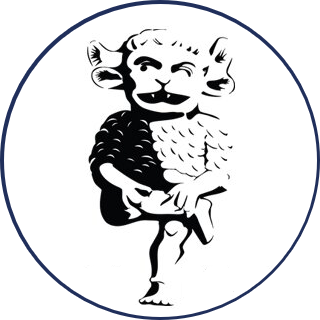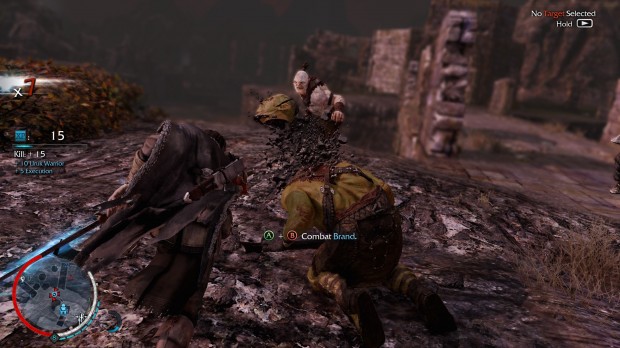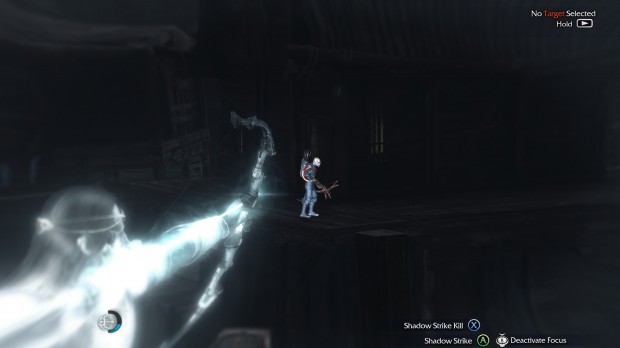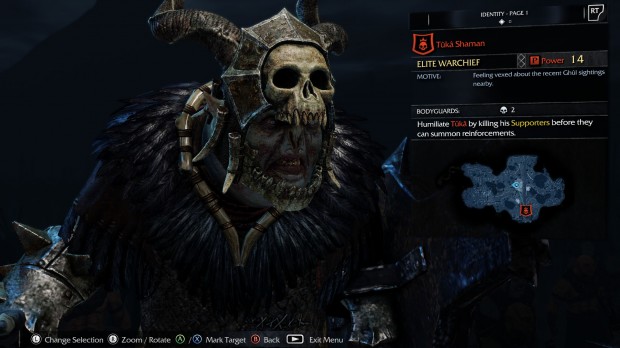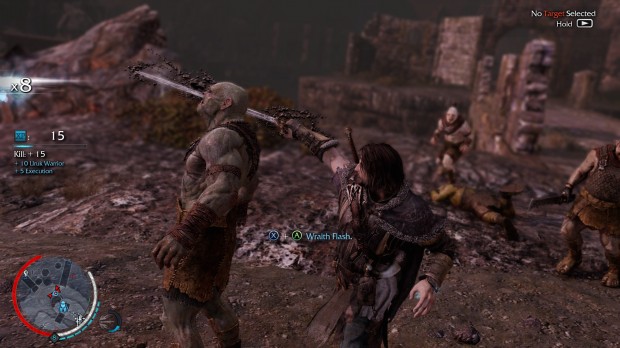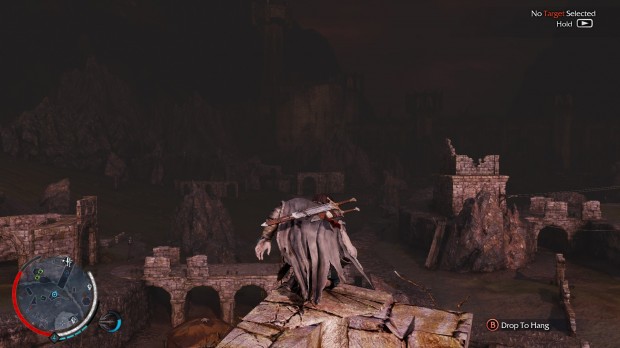BY JAKE HEVNESS
Orc corpse here, Orc corpse there, Orc corpses everywhere. Middle-Earth: Shadow of Mordor is a gloriously bloody step forward in the open world genre; albeit borrowing liberally from its predecessors.
Set between the events of J.R.R Tolkien’s The Hobbit and The Lord of The Rings, the player assumes control of Talion, a slain Ranger of Gondor, resurrected by an ancient wraith. Regardless of Tolkien fandom or interest, Monolith Studios presents a straightforward tale of revenge: kill the evil threatening Middle-earth.
Unfortunately characters came and went, rarely imprinting any emotional attachment. And considering the narrative’s ever building anticipation towards its conclusion, the finale felt completely underwhelming due to a poor semi-boss fight and lackluster writing.
But surprisingly what Monolith’s writers didn’t do, the ‘nemesis system’ did – create meaningful stories. Shadow of Mordor emulates the Orc society by creating Orcs of random names, traits, strengths and weaknesses into a chain of command.
Be it Tazmar Flaming Sword, Uwa Bag Head or – my favourite – Piggu the Tickler, each Orc feels original and personal to your individual experience. Furthermore only the removal of an Orc’s head can prevent his possible resurrection, thus long lasting rivalries between a specific Orc and you are common; each battle opening with a vile insult or a reminder of how he will gut you like a fish.
At best the nemesis system is on par with the joyous experience of roaming the jungles of Far Cry 3, proving that the usual marketing tosh of ‘create your own story’ can come to fruition. Moreover the emulation of a society within an open world game feels like an obvious progression that the genre must make to fully realise the depth of a large virtual world.
Another success for Shadow of Mordor is its combat system. Fast, tactile and visceral. Talion’s sword covered in the blood of a thousand Orcs (literally), all thanks to Monolith borrowing from Warner Bros other famous franchise, the Batman Arkham games. Be it counters, dodges, critical strikes and finishers, if you’ve played any of the Batman Arkham games then you’ll feel right at home controlling Shadow of Mordor. Is that a bad thing?
Not in my opinion. Monolith have taken a solid foundation for the combat system and have accompanied it with superb animation, mostly excellent responsiveness and a wealth of blood and gore.
Despite the undeniably fun nature of slicing and dicing Orc scum, this activity will take up most of your time during your visit to Mordor; which does become repetitive several hours in. “MORE VARIETY PLEASE”, I screamed as many story missions dissolved into stealth killing five guards.
No matter how many collectibles, nor seemingly endless challenge missions can hide the fact that Monolith didn’t provided enough characters, quests and most importantly mission variety. However perhaps J.R.R Tolkien himself is to blame for this lack of gameplay variety.
Monolith stayed true to the source material and created a game which doesn’t deviate greatly from Tolkien lore; this can limit creative scope and is none more evident that the setting. Mordor is bleak, barren and plain. The landscape isn’t littered with NPC towns, nor filled with any interesting environments – unless you love dirt and grass. Monolith have portrayed Mordor as a true to book representation of Sauron’s war machine and therefore sacrificed any joy of exploring the in-game world.
But with that being said Monolith have managed to make Mordor look a nice kind of bleak due to some impressive visuals. Weather effects look gorgeous as you perch from the highest archer tower, Talion’s cloak fluttering in the wind and rain. In particular Shadow of Mordor may contain one of my favourite grass textures of all time, which is an extremely good thing as you’ll be seeing a lot of grass.
Did I enjoy my time with Shadow of Mordor? Yes, at times very much so. The nemesis system deeply entertained me as I fought my way through several epic feuds with memorable Orcs (I’m talking about you Piggu the Tickler). All the more reason it’s a shame that I was often crudely reminded by the story quests that both narrative and gameplay variety came second to slaughtering Orcs.
Regardless, this is still a solid open world game and will please both fans of the genre and Tolkien alike.
